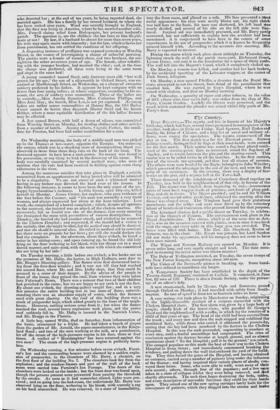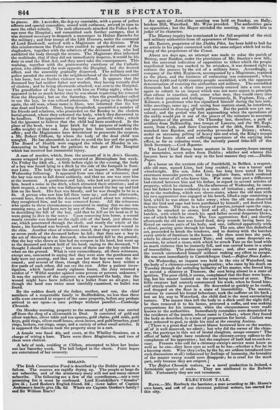ebt COUntr11.
RIDE REGATTA.—Tlie regatta and fete in honour of his Majesty's birth-day, which had been several times postponed in consequence of the weather, took place at Hyde on Friday. Earl Spencer, Earl Roden and family, the Dean of Chester, and a long list of naval and military Officers, were among the spectators. The regatta commenced off the pier at ten. The first match was for the Binstead purse. Sixteen fishing-vessels, distinguished by flags at their mast-heads, were entered for the first match. Their course was round a flag-boat placed northward of the starting-point, then to westward, round the flag-boat off Applcy, and to return between the pier.and the starting-vessel. This course was to be sailed twice in all the matches. In the first contest, two of the vessels ran aground, and thus lost all chance of success. The others were soon headed by the Eagle, belonging to John Wheeler; which preserved the advantage to the end of the race, and won the first prize of six sovereigns. In the evening, there was a display of fireworks on the pier, and a regatta ball at the Town-hall.
Three thousand of the inhabitants of Canterbury dined together-on Tuesday in a field in the neighbourhood of that city, in honour of the Bill. :Clic dinner was English from beginning to end,—innumerous joints of roast beef, waggon-loads of potatoes, cart-loads of plum-pUdding, and ale in rivers. The Mayor presided; and he and Sir William Cosway, and several other gentlemen, addmessed the meeting after the dinner was cleared away. The Wingham band gave their gratuitous attendance, and the tables and seats were fitted up by the voluntary labour of hundreds of tradesmen, who pressed forward for that purpose.
The Liverpool electors had a public dimmer on Tuesday, in celebra
tion of the triumph of Reform. The entertaimnent took place in the Royal Amphitheatre. The circus, which is of the same size as Astley's, was on the occasion covered with planks, so as to raise it to a level with the stage, and every table in this large area was crowded. The boxes were filled with ladies. The Rev. Mr. Shepherd, Rector. of Getacre, was in the chair. -Mr. Ewart was present, but Lord Sand= did not make his appearance, and his company does not seem to have been once missed.
The Wigan and Newton Railway was opened on Monday. It is seven miles long, and very nearly straight and level. The time occupied in steaming the seven miles was fifteen minutes !
The Duke of Wellington reviewed, on Tuesday, the seven troops of the New Forest Banners, comprising about 500 men. The Union of th;'Newcastle pitmen is breaking up. Some hindreds have refused to contribute imy longer.
A Temperance Society has been established in the depot of The Twenty-fourth Regiment, stationed at Carlisle. It contained, in Jane last, 62 men of 170. There is also a female Society, under the patronage of an officer's lady.
A new steam-coach, built by Messrs. Ogle and Summers, passed through Oxford on Monday; it had travelled with safety from Southampton. Its rate of speed is from ten to fourteen miles an hour.
A very serious riot took place in Manchester on Sunday, originating in the highly--blameable conduct of a surgeon connected with the Cholera Hospital there. The first alarm was given by a large body of people, chiefly Irish of the lower class ; who paraded St. George's Road and the neighbourhood with a coffin in which lay the remains Of a child of four years of age. The head of the child had been severed front the trunk ; and every now and then the mob stopped and exhibited the Mutilated body, while those who carried it addressed the passers-by, stating that the boy had been murdered by the doetors in the ChOlbra Hospital. In this way the mob proceeded, augmenting in numbers at every-step, until a fearful assemblage had congregated. The cries, of execration against the doctors became at length general, and an almost unanimous shout" To the Hospital; pull it to the ground," was raised.. The enraged populace on this made the best of their way to the Cholera Hospital in Swan Street ; and immediately commenced breaking the windows, and pulling down the wall that enclosed the yard of the building. They then forced the gates of the Hospital, and having obtained an entrance, carried away a number of patients lying under the influence of the disease ; and having inquired their various places of abode,' conveyed them home. Some, who were able to walk, went away of their own accord; others, through fear of the populace ; and a few wore taken in a state of collapse whilst they were being removed, and died shortly afterwards. The mob then began destroying the beds, tables, and every description of moveable furniture they could lay their hands upon. They seized one of the new spring carriages lately built for the conveyance of patients, which they dragged into the streets and .broke to pieces. Mr. Lavender, the depay constable, with a posse of police officers and special constables, armed with cutlasses, arrived in time to save the other vehicle. The mob afterwards attacked the Police Lockups near the Hospital; and committed such further outrages, that it was deemed necessary to despatch a messenger to Hulme Barracks for the military; and four troops of the 15th Ilussars, under the command of Lord Brudenell, arrived with a Magistrate of the division. With this reinforcement the Police were enabled to apprehend some of the ringleaders, together with the relatives of the deceased boy, who had exhibited the body through the streets. The Magistrate then informed the multitude, that if they did not immediately disperse, it would be his duty to read the Riot Act, and they must take the consequences. This warning, together with the praiseworthy exertions of the Catholic priest, who addressed the mob opposite the Hospital, had the desired effect, and the assembly gradually dispersed. The military and the
i
police paraded the streets n the neighbourhood of the disturbance until a late hour, but no further violence was offered. It appears that the deceased boy had neither father nor mother, they having recently died of cholera; and he being afterwards attacked, was sent to the Hospital. The grandfather of the boy was with him on Friday night ; when he appeared to be so much better that he was about requesting his removal from the Hospital ; but on the Saturday, when the grandfather called to see the boy, he was refused admission. On going to the Hospital again, the old man whose name is Hare, was informed that the boy
was dead and buried. Hare, being dissatisfied, assembled a number of his friends and relatives, who proceeded on the Sunday to the cholera burial-ground, where they exhumed the body, which they discovered to be headless. The appearance of the body was perfectly white ; which led the ignorant to believe that the child had been murdered. In the place of the head, was a large brick for the purpose of making the coffin weighty at that end. An inquiry has been instituted into the affair; and the Magistrates have determined to prosecute the surgeon, a Mr. Robert Oldham, by whom the body of the dead child was mangled. He has absconded, in order to avoid the law and the people. The Board of Health were engaged the whole of Monday in endeavouring to bring back the patients to that part of the Hospital which has received but immaterial injury.
A case of murder, which, from the account of it in Aria's Gazette, seems wrapped in great mystery, occurred at Birmingham last week. On Friday the 24th ult., a little before eight in the evening, the body of a boy was found lying in a ditch by the side of the footpath in Summer Lane. The body was the subject of an inquest on Monday and Wednesday following. It appeared from one class of witnesses, that the boy was seen to fall down suddenly, and that no one was near him at the moment. A gentleman and lady, who had not previously seen him, heard a noise in the ditch, which attracted their attention ; and at their request, a man who was following them raised the boy up and laid him on the bank. His face was bloody, and be was thought to be in a fit. A person who saw him fall then came up ; and soon afterwards, several boys, from whom the deceased had parted about ten minutes; they recognized him, and he was removed home. All the witnesses who spoke to these circumstances concurred in stating that no one was running away, or had been met by any of them. One of the witnesses, in describing the fall of the boy, said that he fell on his head as if he were going to dive in the water. Upon removing him home, a wound nearly circular was found on the right side of the head, just above the ear, which penetrated through the skull, and nearly the whole of the brain ; his forehead was bruised, and there was a lacerated wound in the chin. Another class of witnesses.stated, that they were within six or seven yards of the deceased before he fell ; that they saw a boy in the act of throwing at the deceased, who instantly fell to the ground; that the boy who threw at him had no weapon in his hand, but went up to the deceased and took hold of his hand, saying to the deceased, " I thought I should Catch you ;" but none of them saw the boy strike him when on the ground. What is very extraordinary, all these witnesses, except one, concurred in saying that they were sure the gentleman and lady were not passing, and that no one but the boy was near the deceased; and several of them, though they must have been within a few yards of each other, did not see the rest. After a patient investigation, which lasted nearly. eighteen hours, the Jury returned a verdict of " Wilful murder against some person or persons unknown." It was the opinion of the surgeons who examined the body, that the wound might have been inflicted by a bullet from an air-gun ; but though the head was twice most carefully examined, no bullet was found.
By the sudden death of the father, mother, and son, the chief members of a respectable family in Bedfordshire, no less than three wills were executed in respect of the same property, before any probate arrived to act upon—a case perhaps without paralle1.—Cambridge Chronk.k.
On Monday morning, property to the amount of 1,000/. was carried off from the shop of a silversmith in Deal. It consisted of gold and silver watches, silver table and tea-spoons, gold chains, gold seals, gold keys, gold rings, silver snuff-boxes, scent-boxes, and gold brooches, pearl rings, lockets, ear-rings, snaps, and a variety of other small articles. It is supposed the thieves took the property away in a cart.
A female was fined 40s. and costs, at the Whalley Sessions, on a • cliarge of wiring a hare. There were three Magistrates, and two of them were clerical.
A lady of rank, residing at Clifton, attempted to blow her brains out last Saturday week. The ball lodged in the cheek. Faint hopes are entertained of her recovery.



























 Previous page
Previous page